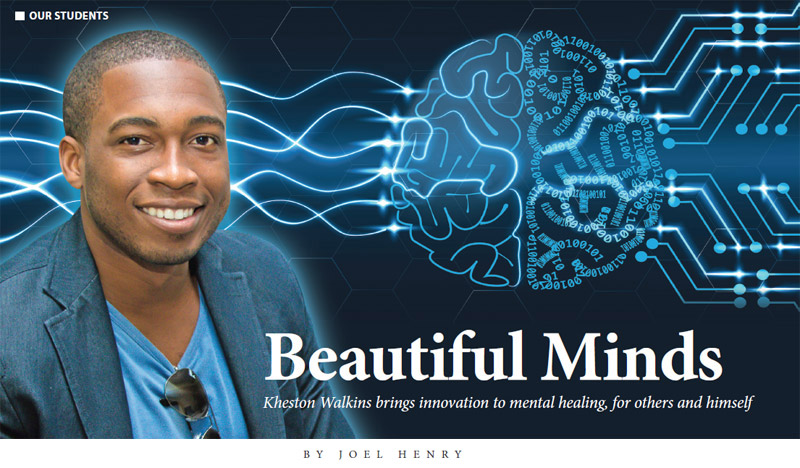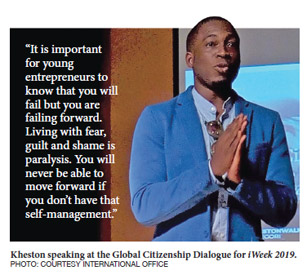 |
 |
 |
|
March 2019 |
When he enters the UWI Today office for his interview Kheston Walkins says a strange thing. I ask him how he’s doing today. He responds, “I’m happy.” It’s jarring to hear. There’s an appropriate answer to such a question - not too enthusiastic, not too open and not too honest. But Walkins is far more concerned about what is right than what is appropriate. It’s one of the secrets to his astounding success. At just 30-years-old, this post residency medical student from The UWI’s Faculty of Medical Sciences (FMS) is an internationally celebrated researcher, innovator and entrepreneur. Born and raised in Chaguanas. He is a PhD candidate in molecular genetics and has been working on cancer detection technology under the supervision of Senior Lecturer at FMS Dr Melford John. Kheston has developed and brought to market several innovative products and services. But perhaps most fascinating of all is where he has directed his enormous creative energies - mental health.
Kheston says MindArt sessions “became events” and “strange kinds of group therapies”. “They would talk about experiences that made them cry in front of people and they were fine with it,” he says. “Afterwards they tell us that MindArt is one of the best experiences they have had in their lives.” Kheston knows well the importance of the kind healing that therapeutic intervention can provide. He was on campus for Internationalisation Week or iWeek, an event hosted by The UWI St Augustine’s International Office. Allegori demonstrated MindArt at the iWeek Technology Display and he was the featured guest at their Global Citizenship Dialogue. His topics include innovative and entrepreneurial thinking, internationalism, and technology. “I love the idea of encouraging students or just people in general so that they can do the things that they want to do,” he says. But what was unexpected was how open he was about his own emotional struggles and the importance of dealing with them to lead a successful life. In fact it was his experience with depression that led to the creation of Allegori. He had been riding high, having developed an app and cloud-based database in 2016 called “Communicare” that was receiving major international recognition. That same year he attended the Young Leaders of the America’s Initiative hosted by the US State Department and was one of only 14 people invited to participate in the Demand Solutions entrepreneurship expo in Argentina, an Inter-American Development Bank funded event. But he hit a roadblock. “We got lots of money to develop (Communicare) and sell it, but it just wasn’t sticking,” he said. “The even harder part was that all the money that I had was dwindling. I went into a depressive phase and sought therapy.” The therapist, in fact, was Ayodike, who would eventually partner with him to form Allegori. “I would say to students, ‘get help’. Get qualified help once you can afford it. I don’t think we take our mental wellbeing seriously.” In fact, Kheston sees mental health as an asset for innovation and entrepreneurship: “Fear, guilt and shame - we need to throw them away. That is the vice grip of Trinidad culture. It starts at home,” he says, adding that it is important for young entrepreneurs to “know that you will fail but you are failing forward. Living with fear, guilt and shame is paralysis. You will never be able to move forward if you don’t have that self-management.” He has moved forward with a vengeance. Since creating Allegori, Ayodike and Walkins have made considerable strides in establishing a neuro-innovation business, one he calls the first of its kind in the Caribbean. Apart from MindArt, Allegori use their blend of therapy and EEG technology to treat clients with mental health issues. Most recently they have branched over to “neuro training” in areas such as focus through their Focus Clinic. The business is doing very well: “We were profitable in two months and doubled our revenue every month after that,” he says. And more importantly, their neuro-innovation is working. “One client was getting panic attacks for 11 years, 7 panic attacks a day. Within three sessions she was getting one panic attack every three days. By the end of the programme (six sessions) she had zero panic attacks. To this day she has no panic attacks.” Apart from creativity and self-expression, healing is a surprisingly consistent theme in Kheston’s words and ideas. Like neuroscience and psychology, creative dynamism and compassion make a good combination. “I don’t really do things for the accolades but the accolades feel good,” he says. “I like creating something that doesn’t exist and doing it well. My focus is on making people’s lives easier or more enjoyable.” |


 “It’s neuro-innovation,” he explains. Kheston and his partner Yohance Ayodike created a company in 2018 called Allegori that fuses neuroscience (the study of the brain and nervous system) with therapeutic counselling. Among the services they offer is “MindArt” an almost supernatural blending of technology and therapy to create abstract art. Participants are asked to tell an emotionally potent story while a headset generates electroencephalogram (EEG) patterns from their brain patterns. The patterns are printed on canvas, creating surreal works spawned from human experience. Thousands of pieces have been created through MindArt.
“It’s neuro-innovation,” he explains. Kheston and his partner Yohance Ayodike created a company in 2018 called Allegori that fuses neuroscience (the study of the brain and nervous system) with therapeutic counselling. Among the services they offer is “MindArt” an almost supernatural blending of technology and therapy to create abstract art. Participants are asked to tell an emotionally potent story while a headset generates electroencephalogram (EEG) patterns from their brain patterns. The patterns are printed on canvas, creating surreal works spawned from human experience. Thousands of pieces have been created through MindArt.